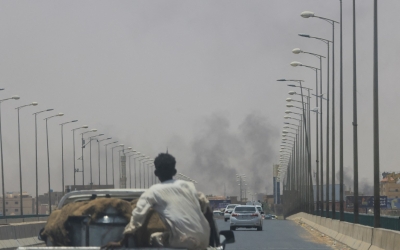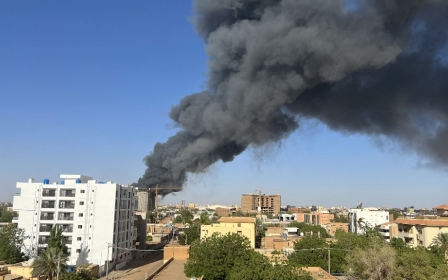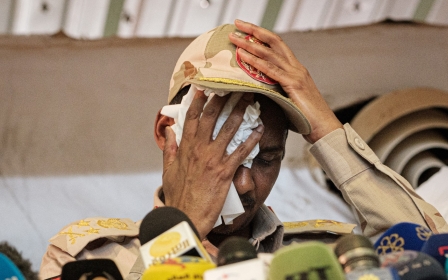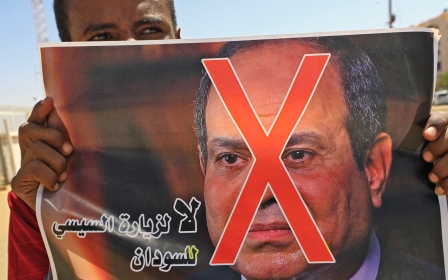Sudan crisis: Where are the country's civilian leaders?

After the outbreak last month of a devastating conflict between Sudan’s army and the Rapid Support Forces (RSF) paramilitary group, one local columnist lamented the failure of the Forces of Freedom and Change (FFC) to form a purely civilian government from the ranks of protesters who brought down Omar al-Bashir in 2019. Such a move at the peak of the uprising, he argued, could have forced the military out of politics.
In truth, it is impossible to know what would have happened had the FFC taken such decisive action at the start of the transitional period, rather than eventually entering into a power-sharing government with the military in August 2019. Today, lamentably, most international attention is focused on the two generals - RSF leader Mohamed Hamdan Dagalo and Sudanese army chief Abdel Fattah al-Burhan - rather than on the civilian actors the revolution sought to empower.
One of the major obstacles to civilians having a stake is that all the regional powers who have sought a role in inter-Sudanese talks in recent years have preferred to interact with military figures.
Empowering civilians aspiring towards a democratic transition does not come easily to neighbouring governments, which are themselves far from democratic - and in the cases of Egypt and South Sudan, heavily dominated by the military.
An example of this is the 2020 Juba Peace Agreement, which brought many of the rebels who later backed Burhan’s coup into the government, but which had little civilian involvement, even though the civilian presence in the transitional government at the time was at its strongest.
New MEE newsletter: Jerusalem Dispatch
Sign up to get the latest insights and analysis on Israel-Palestine, alongside Turkey Unpacked and other MEE newsletters
After Burhan’s coup against the civilian component of the transitional government in October 2021, the military, with the support of regional powers, was able to dictate the terms on which talks took place, leading to the widely rejected Hamdok-Burhan agreement of November 2021.
Egypt’s interventions in the build-up to the outbreak of the current conflict are also a case in point. After the signing of the December 2022 framework agreement by the military and the FFC Central Council, Egypt hosted a parallel political dialogue with the rival FFC Democratic Bloc, which had refused to sign.
Some of the constituents of the so-called Democratic Bloc had been co-opted by the previous military regime of Bashir, and their refusal to sign the framework deal speaks to the damaging legacy of the former president’s efforts to divide and rule. Others were rebel signatories of the Juba accord who retained roles in the transitional government after the 2021 coup, effectively siding with the military over the civilians.
Countering narratives
Part of the reason why armed rebels have been able to outmanoeuvre civilians is that they have put forward the narrative that the current civilian political groups only represent the centre, not the peripheries.
This is a legacy of long-term historical processes, whereby both national and international governments have treated civilians as interlocutors on behalf of urban populations in the northern riverine core, and armed rebels as representatives of the regions.
This highlights the challenge the civilians face; only those with the closest ties to the military are trusted as interlocutors
Sudan People’s Liberation Movement-North leader Malik Agar argued that the reason his faction would not sign the framework agreement was that it was a product of Khartoum politics that did not represent marginalised regions, arguing that bodies affiliated with the Sudanese Congress Party and the Sudanese Professionals Association were over-represented among the signatories.
Civilians have fought hard to counter such narratives. Representatives of the Sudanese Professionals Association argued after the coup that civilians would have to bypass the rebels and speak directly to the constituencies they claimed to represent in the regions.
Meanwhile, the Revolutionary Charter for People’s Authority, one of the major political charters issued by the resistance committees last year, called for a thorough restructuring of relations between town and countryside that would give considerable power to local civilian councils.
While the outbreak of fighting between the RSF and Sudanese Armed Forces (SAF) has led to considerable scrutiny of the two warring military factions, civilians remain relevant today. The National Umma Party actively attempted to prevent the outbreak of conflict, then to bring about a ceasefire when it occurred. It mediated intensely between the SAF and RSF in the week before the outbreak of fighting, securing an agreement on 14 April to form a joint SAF-RSF committee to de-escalate the crisis.
Mediation efforts
After the outbreak of fighting, party leaders continued to call for the committee to be established in order to arrange a ceasefire - but on 17 April, party leader Fadlallah Baramah Nasser admitted they had not been able to communicate with the two warring parties.
The National Umma Party had courted both Burhan and Dagalo since the early days of the transition, and as such, it was well-positioned to mediate. Nasser is himself a former army officer who served on the original 1985 Transitional Military Council. This highlights the challenge the civilians face; only those with the closest ties to the military are trusted as interlocutors.
On 18 April, a group of Sudan’s leading politicians put their names to a statement calling on the warring parties to immediately cease fighting and return to dialogue. It was endorsed by the most prominent leaders from the FFC Central Council and some, but not all, from the FFC Democratic Bloc.
Even as the soldiers continued to fight it out, the civilian signatories to the framework agreement maintained that the solution to the crisis must adhere to the principle of a “single, professional and national army”, with the RSF being integrated into the Sudanese army in accordance with a specific timetable.
Meanwhile, the resistance committees have been at the heart of efforts to provide humanitarian support to citizens on the ground affected by the fighting.
This week, Yasir Arman, spokesperson for the FFC Central Council, issued a call for civilians in areas unaffected by the fighting to take to the streets to demand that the warring parties negotiate. Such a movement could recapture the spirit of the original April 2019 sit-in at the army headquarters, which sought to make the military bend to the popular will.
The views expressed in this article belong to the author and do not necessarily reflect the editorial policy of Middle East Eye.
This article is available in French on Middle East Eye French edition.
Middle East Eye delivers independent and unrivalled coverage and analysis of the Middle East, North Africa and beyond. To learn more about republishing this content and the associated fees, please fill out this form. More about MEE can be found here.






